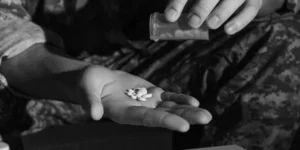Euphoria's Highs Reveal The Thin Line Between Pleasure And Pain
How do euphoria-inducing substances and activities affect our brain's reward system and overall happiness? Our counsellors are here to help you today.
FREE ASSESSMENT082 747 3422Euphoria, characterised by an intense sensation of happiness or a ‘high,’ can result from both substance use and certain activities. It signifies a state of heightened pleasure or excitement, often linked with the consumption of drugs or alcohol. These substances stimulate the brain’s reward system by releasing neurotransmitters such as dopamine, leading to the euphoric feeling. This sensation can create a compulsion to use these substances again, paving the way for addiction.
Initially, euphoria might seem like an escape from emotional distress or a pathway to feeling unbeatable. However, it’s important to understand that this feeling is deceptive and temporary. As the brain adapts to the substance, it demands more to reach the same euphoric state, spiraling into dependence and deepening addiction.
The double-edged nature of euphoria—spanning both psychological wellness and addiction—highlights its complexity. While it naturally occurs during rewarding experiences, addictive substances artificially amplify this feeling, driving the cycle of addiction. This cycle involves an increasing tolerance to the substance, a growing risk of addiction and the potential for withdrawal symptoms.
While euphoria might offer a temporary reprieve from psychological discomfort, it also conceals underlying problems and can warp one’s perception of reality, encouraging neglect of the consequences of substance use. Recovery efforts aim to restore the brain’s natural reward mechanisms and address addiction’s root causes, creating authentic happiness and health.
Recognising the fleeting and misleading nature of substance-induced euphoria is vital for prevention, treatment and the promotion of lasting well-being.

Sexual abuse, defined as the forceful engagement in sexual acts without consent, often by someone…

Maladaptive behaviors are detrimental actions or coping mechanisms that negatively impact an addict’s physical, emotional…

Narcotics Anonymous is not a miracle, not a lecture series, and not a place where…
What were the key reasons for the shift of PCP from a medical anesthesia to a popular recreational drug despite its severe side effects?
What strategies can be implemented to address the alarming rates of drug and alcohol use among UK teens and strengthen the need for effective rehab centres?
Inpatient Rehab
Rehab care is a good option if you are at risk of experiencing strong withdrawal symptoms when you try stop a substance. This option would also be recommended if you have experienced recurrent relapses or if you have tried a less-intensive treatment without success.
Outpatient
If you're committed to your sobriety but cannot take a break from your daily duties for an inpatient program. Outpatient rehab treatment might suit you well if you are looking for a less restricted format for addiction treatment or simply need help with mental health.
Therapy
Therapy can be good step towards healing and self-discovery. If you need support without disrupting your routine, therapy offers a flexible solution for anyone wishing to enhance their mental well-being or work through personal issues in a supportive, confidential environment.
Mental Health
Are you having persistent feelings of being swamped, sad or have sudden surges of anger or intense emotional outbursts? These are warning signs of unresolved trauma mental health. A simple assesment by a mental health expert could provide valuable insights into your recovery.
Is My Loved One Addicted?
Your responses are private and not stored.
It’s Professional.
Clinically grounded
Clear, practical guides on addiction and recovery, based on recognised treatment principles and South African experience.
Therapy for addictionIt’s Affordable.
Straight talk on costs
We unpack typical fees, medical-aid issues, and funding options so you can compare treatment choices without sales pressure.
Paying for treatmentIt’s Convenient.
On your terms
Short explainers, checklists, and FAQs you can read, save, and share in your own time, from any device.
What to expect in rehabIt’s Effective.
Better decisions
We focus on evidence-based guidance and honest discussion of risks, relapse, and family impact to support long-term recovery.
Evidence-based















